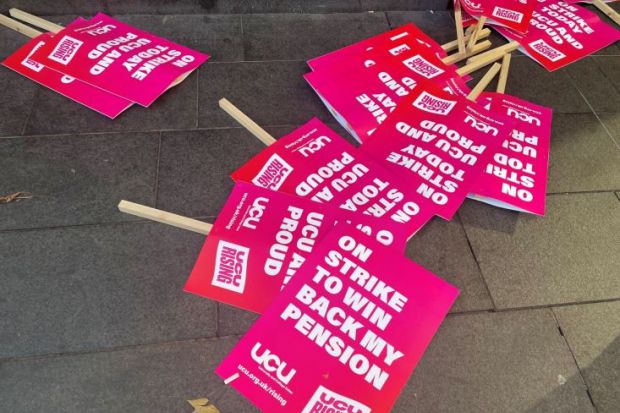The University and College Union is attempting to unite its members again as they gather in Glasgow for their annual congress, but tensions connected to the marking boycott and ongoing divisions over strategy have prompted a warning about abuse.
General secretary Jo Grady faces a motion of censure and one of no confidence at the three day congress, having narrowly won a vote when faced with censure last year.
Foreseeing a charged atmosphere, the Unite UCU branch, which represents the union’s staff, has issued a statement reminding delegates that only Dr Grady has a right of reply at the conference and staff who are not able to respond “should not be criticised in democratic debate for carrying out their duties.”
“Unite has made representations to the congress chairs and the employer that they should ensure all speakers at UCU congress abide by standing orders and not be abusive or offensive,” it says.
“If speakers identify and criticise individual staff members who do not have the right of reply, then our expectation is that this will be ruled out of order by the chairs of congress in accordance with the rules for conduct of members/delegates.”
The motions targeting Dr Grady focus on the controversial decision to pause strike action in February, which she said at the time was necessary to allow for a “period of calm” while the union holds “intensive negotiations” with employers. Her critics claimed employers had only offered further talks – not anything concrete on pay and conditions – and therefore such a pause was not justified.
The censure motion from the Cardiff and Bournemouth UCU branches calls this a “tactical mistake which could lose the dispute” and also criticises what it says were delays in calling industrial action.
A no confidence motion backed by Ulster and Kingston universities as well as the universities of Sunderland and Oxford and the Royal College of Art, goes further and states “acceptance of this offer constitutes a serious defeat for UCU.”
Various attempts to change the union's rules to establish how such decisions are made in future will also be debated by the congress, with proposals ranging from a full consultation of members to appointing a dispute committee with a veto over decisions.
Elsewhere at the event, members will debate next steps in industrial action. Bangor University and the University of Essex are calling for an 18- to 24-month campaign “focused on achieving significant movement on the issues beyond the current dispute, including an above inflation pay rise, concrete advances on progress related to casualisation, an end to hourly contracts, unequal pay, workload and a 35-hour working week, with a focus on growing membership and member confidence”.
UCU members returned to the picket lines in March and then began a marking and assessment boycott on 20 April after voting to reject proposals put forward by employers on pay and conditions.
The Universities and Colleges Employers Association (Ucea) has declined to negotiate while the boycott is ongoing, which has stalled progress. Earlier this week the University of Cambridge urged both sides to return to the negotiating table, something Ucea chief executive Raj Jethwa said he welcomed, adding that “the ball is in UCU’s court”.
Taking aim at congress attendees, Mr Jethwa added that UCU “must avoid its usual infighting and carefully consider students and members, as this looks to be a last chance for an agreed solution to return to the table”.
At the same time, further progress has been made in the pensions dispute and UCU and Universities UK have again reiterated their “joint commitment to the restoration of pre-April 2022 benefits, where this can be done in a demonstrably sustainable manner”.
Dr Grady said staff had been “scoffed at, ridiculed and told to move on” when they demanded their pensions back.
“But, today, they have taken another big step towards seeing their retirement benefits restored, in full. This would be an incredible victory which will see our members become history makers of the trade union movement.”

